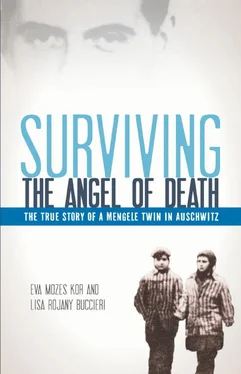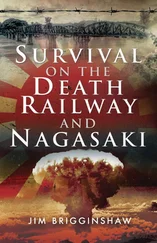“Why?” asked Miriam.
“Just come with me.”
We hopped on a streetcar and went to the camp. When we found Mrs. Csengeri, I began talking a mile a minute. “You were my mama’s friend,” I said. “We don’t want to stay in the monastery, but they won’t let us leave because we can’t find our parents.”
“Yes, I know,” she replied. “But why are you telling me all this?”
I paused and then blurted, “Would you sign a paper saying you are our aunt and get us out so we can go home?”
At first, Mrs. Csengeri said nothing. Finally she said, “OK. I will go to the monastery with you and sign the papers.” She paused and then added, “And then I will take you home with me.”
I was overjoyed.
In March of 1945 Miriam and I moved into the camp with Mrs. Csengeri and her daughters. We lived in a room in the barracks and shared it with a lady, Mrs. Goldenthal, and her three children.
Mrs. Goldenthal’s twin boys, Alex and Erno, were our age, and I discovered that they had been selected at Auschwitz for Mengele’s experiments like us. Mrs. Goldenthal had stayed with them, and I found out later that she had hidden a younger child, Margarita, underneath her long skirt. She had come into the camp with the child hidden in her dress and during her entire stay there, even in the Nazi barracks where she had kept Margarita under the mattress during inspections, she and the other women had helped conceal her child.
Now Mrs. Goldenthal and Mrs. Csengeri took care of all of us. They washed us and boiled our clothes. They got rid of the lice. Mrs. Csengeri sewed dresses for Miriam and me out of big Soviet khaki tunics. Wearing that dress made me feel like a little girl again. She even fixed special food for us. Miriam and I almost felt like a family again, being cared for by adults, the way it used to be.
The Soviet soldiers in charge of the camp gave us bread and a half a ruble every week to spend on anything we wanted. Sometimes Miriam and I went to the outdoor market in town to buy an apple. Normally we were given plain food that filled us, such as bread, potato soup, and meat. An apple was a luxury that we were thrilled to have.
One morning, After a month and a half, Mrs. Csengeri woke me up from a deep sleep. “Pack everything,” she said, “because we’re moving.” We gathered our things together. Miriam and I, hand in hand in our matching khaki dresses, boarded a train with our small group. I had no idea where we were going, but we knew where we wished to go. All I wanted was to find my parents or somebody from my real family. All I wanted was to go home.
Soviet soldiers took charge as Miriam and I began the journey home with Mrs. Csengeri, Mrs. Goldenthal, and their children. Although we rode in a cattle car, it was very different from our ride to Auschwitz. The train was not crowded, and there were built-in bunk beds with little mattresses that were comfortable. We loved to sit on the top bunk bed and look out the windows, which this time were not covered by barbed wire. At night we had as many blankets as we wanted. Miriam and I cuddled. We still did not talk about how we felt or what was going on. We just snuggled.
In the daytime, the doors of the train cars were left open. Often Miriam and I sat in the doorway with our legs dangling out. The train lumbered on the tracks so slowly you could almost run alongside. The wind brushed our faces and the fresh air felt wonderful. We enjoyed watching fields and hills slide by. It was spring. Flowers bloomed, birds chirped.
We were no longer in danger. We were free.
Sometimes the train stopped for five or six hours. We’d get off, and Mrs. Csengeri would set up two bricks, make a small fire, and cook something in a pot. The Soviets gave us bread and rations, but we had also taken along some food. I no longer had to worry about feeding us. Mrs. Csengeri took over and never complained. When the conductor called that the train was about to leave, we hopped on again.
We were heading toward Romania. On the train we sang and talked. Mrs. Csengeri and Mrs. Goldenthal said they were going to save the striped prison uniforms they had worn at Auschwitz and testify to the world what had happened there. “I’ll tell my story,” Mrs. Csengeri kept saying. “I will tell what these monsters did to us.” Back then I did not understand why that was so important. I could not imagine who would want to hear about Auschwitz, but the women kept discussing it. The question came up as to whether their husbands had survived. I wondered if anybody in my family had survived besides Miriam and me. Nobody really knew.
Sometimes we passed through villages and towns that had been destroyed by bombing. Brick buildings lay in ruins. Rubble covered the ground. Some places seemed altogether abandoned. We went from Katowice in Poland to Czernowitz near the Romanian border. At the outer edge of the city we stayed at a camp that may have been a labor camp or ghetto. We remained there for about two months and thought we were getting closer to home.
One afternoon we were told to pack up, and we were loaded into another cattle car with bunk beds. As the train rumbled on, the grownups realized that we should have already reached Romania; Transylvania had become part of Romania again, it was no longer Hungary. Mrs. Csengeri watched the signs and said we were going deeper into the Soviet Union. When the train crawled uphill, some people jumped off and rolled away from the tracks. “Where are they going?” I wondered. For years I wondered what happened to them. Later I realized that many people were frightened of the Soviet Union and did not want to live under communist rule.
After a week we arrived at a refugee camp in Slutz. It was close to Minsk in the Soviet Union. We lived there for a couple of months with former prisoners from all over Europe. Finally we were grouped according to our home countries.
One day in October we started back into Romania. Our first stop was Nagy Varad Oradea, Mrs. Goldenthal’s town. She and her children went home. I was so envious! I wanted to be back in our home! That night the rest of us stayed in a hotel near the train station and had dinner there. The food was very, very good, consisting of baked potatoes and fried eggs with seasoning, with apples and ice cream for dessert. For once, we were full after we ate. A Jewish agency gave us the money to pay our bill. Every town that had once had a Jewish population now had a Jewish agency to take care of displaced persons like us and help reunite families.
The next day we boarded another train and rode south to Simlel Silvaniei, Mrs. Csengeri’s town. She invited us to stay overnight. In the morning we thanked her for taking care of us and took the first train to Portz, our village.
When the train stopped and the conductor called, “Portz!” I immediately recognized the station. Holding hands, Miriam and I got off at the top of the hill and started down to the village. “Let’s go home,” I said. I had to see it. I am not sure what I expected to find. Would everything be the way we had left it, only maybe a little disheveled from the months we had been away? In my mind, home meant Miriam and me, our sisters and my parents, the farm and our animals. Any homecoming had to include at least some of these, right? I allowed myself to hope that there would be something good waiting for us.
Hand in hand, Miriam and I walked through the village. We were wearing our matching Soviet khaki tunic dresses, and I still had the shoes from the camp, twice the size of my feet. When I took a step, the front of the shoe flopped down first. People came out of their houses and whispered to each other. Nobody spoke to us directly. They just stared at us as we walked down the street. Miriam and I still looked alike. I had a feeling that the villagers knew who we were.
Читать дальше












